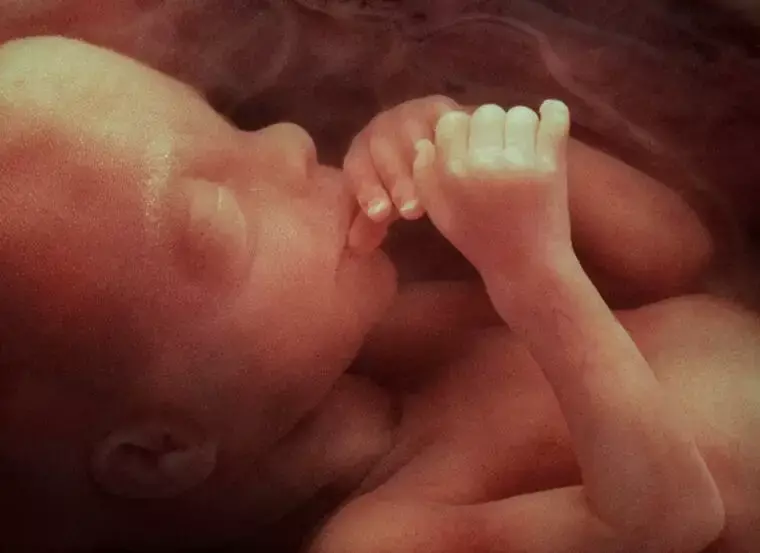Recent scientific advances are bringing us closer to understanding infant consciousness development and answering a question that has puzzled scientists, parents, and philosophers alike for centuries: when does consciousness begin?
In a new study published in the peer-reviewed journal Trends in Cognitive Science, an international team of researchers says empirical evidence suggests infants possess consciousness before birth, by at least the third trimester of pregnancy.
Researchers say the findings and pinpointing the moment when consciousness first appears could have significant clinical, ethical, and legal implications.
Historically, the question of when consciousness first emerges has been a topic of much speculation and debate.
It is generally accepted that the growing human fetus lacks the neural cells required for consciousness during the first trimester of pregnancy. However, traditional viewpoints differ widely on when consciousness first emerges.
Some recent studies have proposed that consciousness emerges 24-26 weeks after conception when thalamocortical connections activate the neural cortex.
Others have argued that infants lack the higher-order thought necessary for self-awareness until around the first birthday or even later.
In this recent study, a team of neuroscientists and philosophers from Monash University, the University of Tübingen, the University of Minnesota, and Trinity College Dublin conducted a meta-analysis of the latest empirical findings and methodological advancements in infant consciousness development research.
A vital component of the meta-analysis was accepting the complex nature of consciousness as a subjective phenomenon characterized by a unique experiential point of view.
Unlike adults and older children, infants cannot verbalize their experiences. Instead, researchers had to rely on indirect markers to gauge the presence of consciousness. These markers include behavioral responses, neural activities, and developmental milestones.
Examining these indirect markers, researchers found that several lines of evidence pointed to the early emergence of consciousness.
One key piece of evidence was the development of intrinsic connectivity networks in the brain, such as the default mode network (DMN), which are active early in development.
These networks, typically associated with higher cognitive functions, are present in newborns and preterm infants, suggesting the early onset of consciousness.
Researchers also examined the role of attention in consciousness development. It’s generally understood that top-down (voluntary) attention develops around 3 to 6 months of age, while bottom-up (involuntary) attention is evident from birth. This distinction is crucial as it indicates that the emergence of consciousness might be linked to the development of attentional capabilities.
Another intriguing line of evidence came from the study of multisensory integration in infants. Certain complex forms of multisensory integration, thought to occur only when stimuli are consciously perceived, have been observed in infants as young as four months. This further supports the early-onset theory of consciousness.
Auditory processing also offers insights. The study highlights an auditory oddball paradigm used in infants, showing responses that suggest perceptual consciousness. This method reveals that even in the earliest stages of development, infants can show a sophisticated level of neural processing that hints at the presence of consciousness.
The study also delved into the qualitative aspect of infant experience and the question: “What’s it like to be a baby?”
While infants’ perceptual systems are immature, they still appear to have rich auditory experiences and possibly an enhanced awareness of their bodies.
Current research has generally found that the development of consciousness in infants is characterized by increasing sensitivity to a broader array of environmental stimuli over time. This process is known as perceptual expansion.
However, this expansion is also accompanied by a phenomenon known as perceptual narrowing, in which infants gradually lose their ability to distinguish between certain features they were once sensitive to.
In an example of perceptual narrowing, studies on infant speech processing have found that 6- to 10-month-olds raised in English-speaking households can discriminate between consonants used in Hindi that monolingual English-speaking adults cannot. However, this ability to recognize lexically significant tones is typically lost by 10 months of age.
In the end, meta-analysis showed that current empirical evidence supports the early onset theory that infants possess some degree of self-awareness by at least the third trimester of pregnancy, generally 35 weeks after gestation.
“Just as recent methodological advances are beginning to provide tentative (albeit limited) answers to questions about consciousness in non-human animals and severely brain-injured individuals, they are also beginning to provide tentative (albeit limited) answers to questions about the first stirrings of human experience,” study authors wrote. “In particular, some newer strands of evidence seem to point towards consciousness having an early onset, rather than a late onset (as has often been assumed).”
However, in their concluding remarks, researchers emphasize that “the problem of identifying when and in what form consciousness begins is very far from being solved”
Instead, study authors say the findings legitimize the study of infant consciousness by providing a compelling framework to advance the discussion within the broader context of neuroscience.
Ultimately, researchers assert that a comprehensive understanding of when consciousness arises will require the development of a universally acknowledged and complete theory of consciousness.
“Although progress in understanding the origins of consciousness will likely be advanced by a better understanding of brain development, understanding the implications of developmental data for accounts of the emergence of consciousness will also require a better understanding of the neural and functional basis of consciousness,” researchers wrote.
“This review has taken a theory-neutral approach to infant consciousness, but it is likely that a full understanding of the emergence of experience will require the development of a complete and widely accepted theory of consciousness.”
Tim McMillan is a retired law enforcement executive, investigative reporter and co-founder of The Debrief. His writing typically focuses on defense, national security, the Intelligence Community and topics related to psychology. You can follow Tim on Twitter: @LtTimMcMillan. Tim can be reached by email: tim@thedebrief.org or through encrypted email: LtTimMcMillan@protonmail.com

